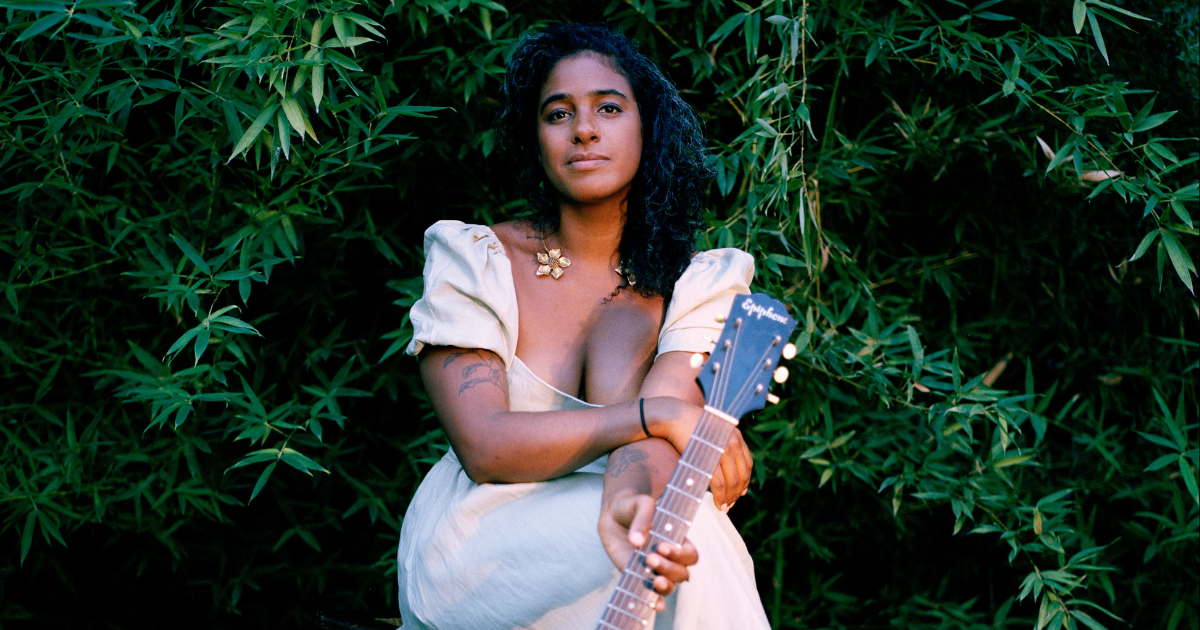Since her solo debut in 2014, Vari-Colored Songs: a Tribute to Langston Hughes, multi-instrumentalist, composer, songwriter, and thought leader Leyla McCalla has routinely and consistently expanded her own sonic universe. But these have not been gratuitous or ambitious artistic reinventions. Instead, the cellist and multi-instrumentalist intentionally and organically brings in new and exciting textures, influences, stories, cultural touch points, and text paintings into her work. On April 12, she’ll continue in a similar vein, once again broadening her own endless musical horizons with a brand new record, Sun Without the Heat, available via ANTI-.
After Vari-Colored Songs, a collection of thoughtful, dense, and engaging adapted Hughes poems, Haitian folk, and originals, the critically acclaimed and “fan favorite” collection, A day for the hunter, a day for the prey (2016), brought in still more French, Haitian Creole, and bilingual material, underpinned by string band sounds that recalled her days performing and recording with the Carolina Chocolate Drops – but with many iconoclastic wrinkles and touches uniquely her own. At no point has there seemed to be any floundering or self doubt, musically and otherwise, in McCalla’s releases, but still their progression points to a growing confidence, an indelible sense of self, and an unwavering commitment to telling often untold stories. Time and again, she plumbs the depths of her own soul, her family, her lineage to discover and honor narratives regularly left in the shadows.
Sun Without the Heat certainly finds McCalla – who is based in New Orleans – covering exciting, tantalizing new ground that neither feels entirely new or, again, like any sort of attempt at frivolous reinvention. Instead, this album is a re-distillation of the personal journey – whether inward or outward – that McCalla has invited us to join her on since Vari-Colored Songs. Over 10 tracks, Sun Without the Heat is fiery while inviting, with limitless sparks and an intractable gravity. Building on her Haitian roots, which remained front-and-center in 2019’s incredible The Capitalist Blues and also anchored her theatrical sort-of-concept album, Breaking the Thermometer (2022), on Sun Without the Heat McCalla again subverts antiquated ideas around “world music” and global folk by grounding Afrobeat, Ethiopian music theory, Brazilian Tropicalismo, and more in her American folk and string band expertise.
The result, like on The Capitalist Blues and Breaking the Thermometer, is as charming as it is dense, crave-able and nutritious, entirely one-of-a-kind while obviously interconnected with so many constituent musical traditions. There are clearly lessons learned and perspectives gained from her time collaborating with supergroup Our Native Daughters – with Amythyst Kiah, Allison Russell, and Rhiannon Giddens – here, too. On the new album, with her arm-length resumé at her disposal, McCalla remains the industrial-strength adhesive holding together all of these seemingly disparate parts. Sun Without the Heat’s current singles, “Scaled to Survive” (listen above), “Tree,” and “Love We Had” are a perfect aural triptych to demonstrate McCalla’s deft combination of inputs to create a singular output.
It’s nearly impossible to overstate the impact the Carolina Chocolate Drops and its now legendary alumni have had on American roots music and global folk. Giddens, Dom Flemons, Rowan Corbett, Justin Robinson, and more each continue to increase their audiences’ scope of understanding well after their time in the Grammy Award-winning group. But the niche McCalla has carved out and built a home for herself within since branching out from the band is truly her own.
Sun Without the Heat is timeless while Afrofuturist, essential but never essentialist. This is folk music crafted in the spirit of folk musician activists the world over since time immemorial. When you listen to McCalla, whether Sun Without the Heat or Capitalist Blues, or any of her five studio albums, you can rest assured what you’re hearing is truly idiosyncratic, while she never lets her listeners mistakenly assume she and she alone is the sole arbiter of these sounds, genres, and traditions. It’s a deft balancing act that perhaps only she can execute with such ease and such entrancing music.
All month long, we’ll be celebrating Sun Without the Heat and Leyla McCalla as our Artist of the Month. Enjoy our Essential Leyla McCalla Playlist below and stay tuned for our AOTM interview to come later in April.
Photo Credit: Chris Scheurich

